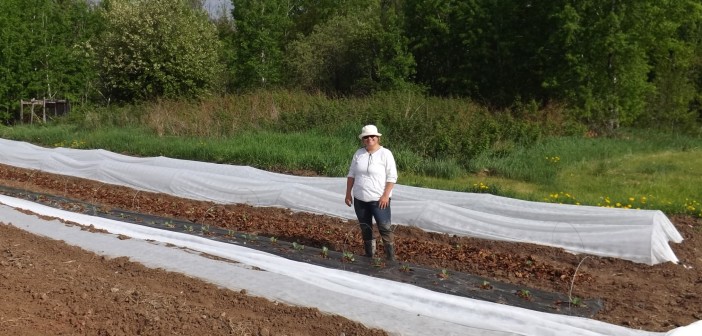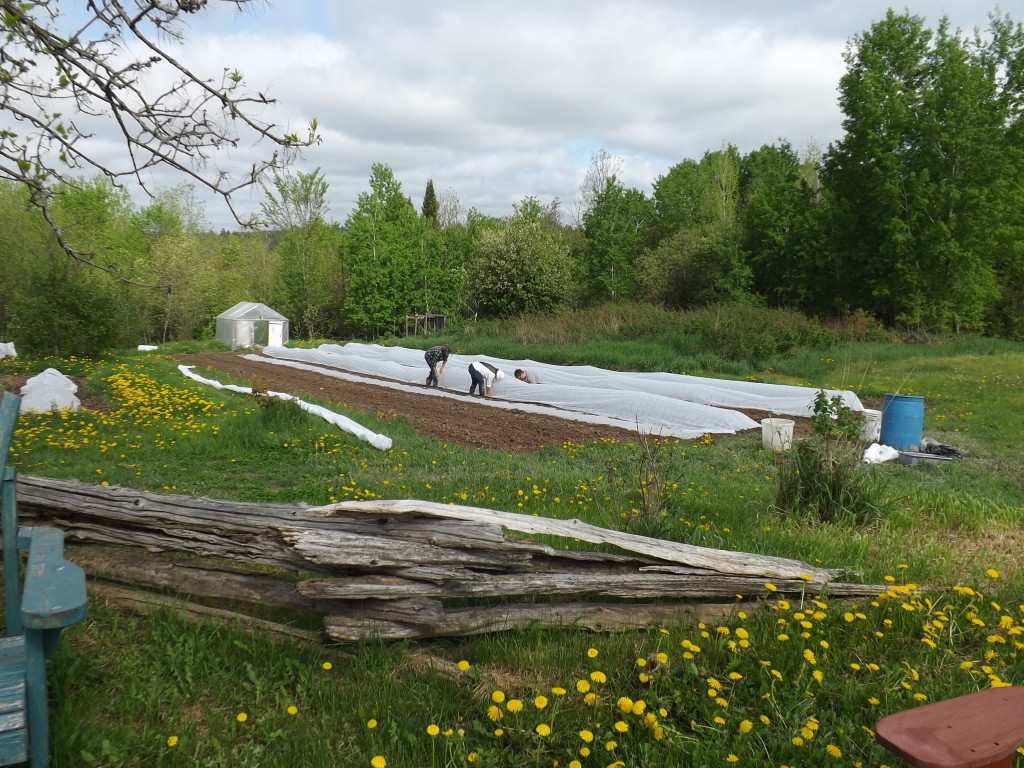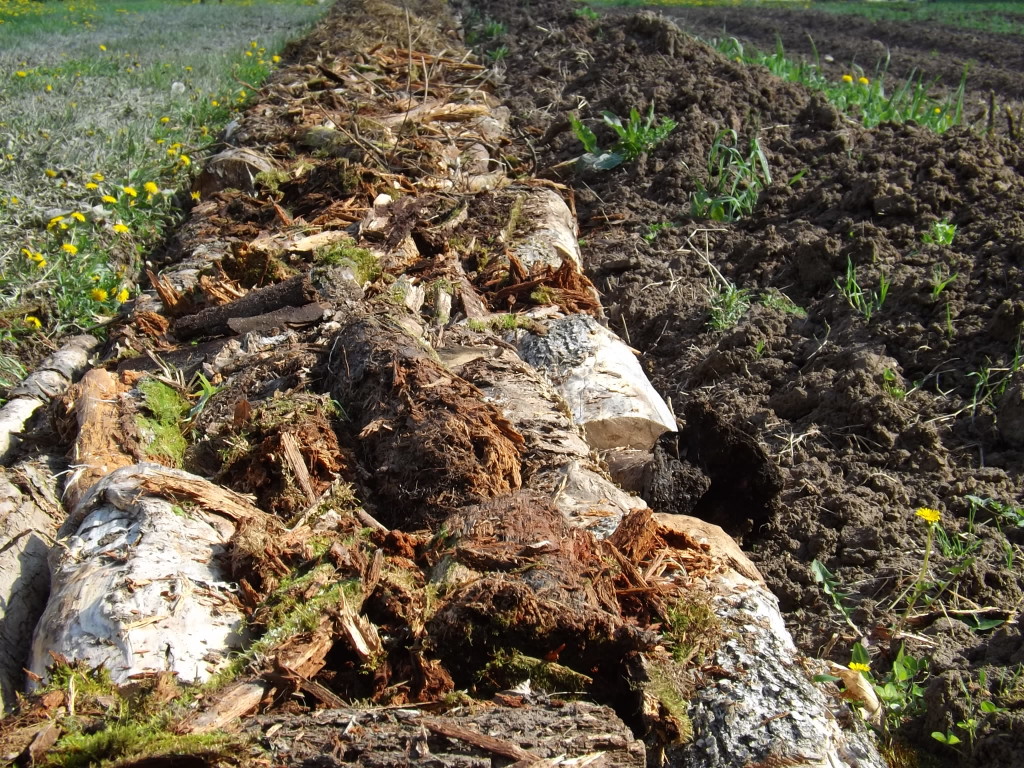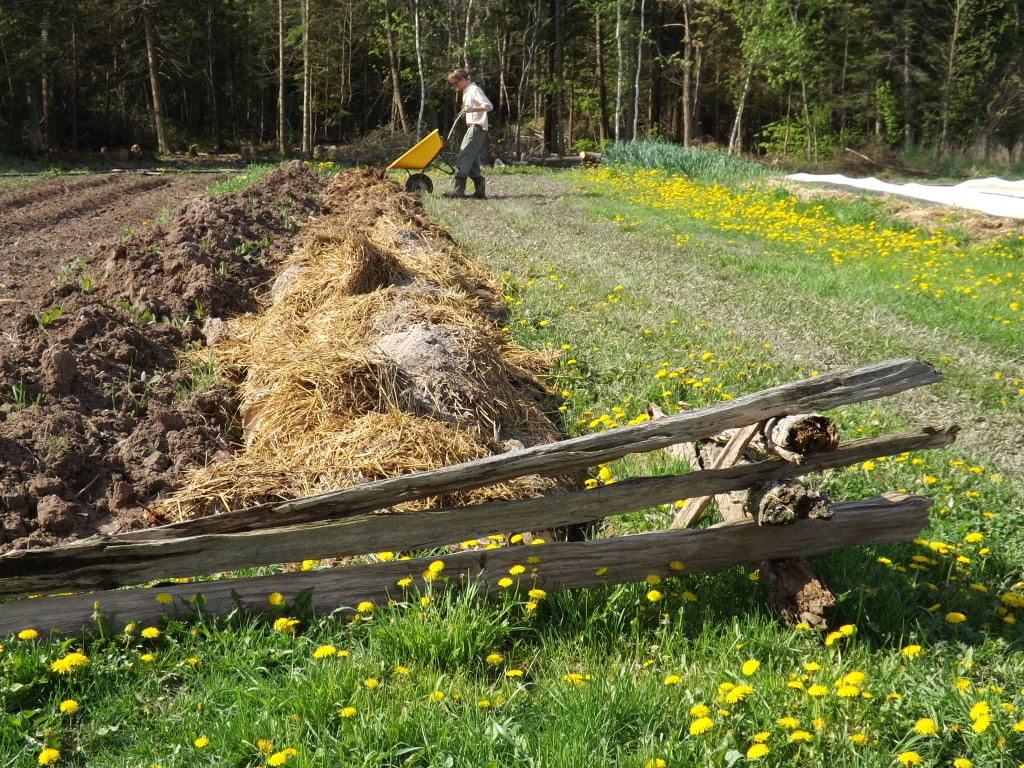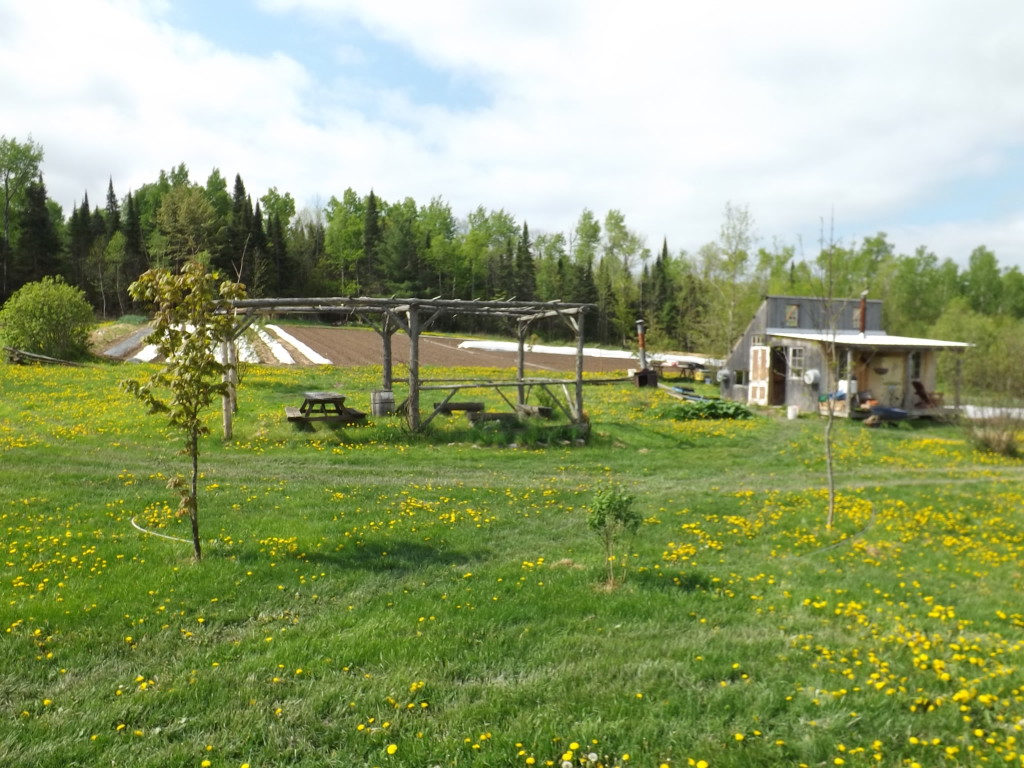It’s been two months but we’ve finally caught up with Fannie McFadden. Since our last visit the snow has melted and the baby chicks have grown up. With the help of three hired hands- and her husband who Fannie lovingly calls ‘Big Daddy’ -but you can call him Ken, tens of thousands of seeds have been sown. Exactly 120 rows running between 150 – 200 feet in length roll across Fannie’s fields.
I arrived at McFadden’s Acres Certified Organic Farm Thursday morning and hunted Fannie down in her corner field, transplanting 250 broccoli seedlings with the assistance of Michelle and Kim. Protecting the transplants from weather and bugs was a three woman job –but it looked fun. Remember playing with the giant parachute in Grade five?
(below: Fannie will plant three harvests of broccoli this season.)
Though a frost the weekend earlier claimed some of her transplants it’s not enough to set Fannie back. “We lost a few things but that’s why we always plant a little extra. That’s just a part of farming. But it wasn’t drastic and it’s no problem.”
By the end of the season Fannie will have grown enough produce to feed 250 people between the months of June and October. Always looking for ways to make the most of the 2 acres of land dedicated to field, Fannie is experimenting with hugelkultur this year- 4 rows in total. Don’t know what hugelkultur is? Neither did I but I’m diggin’ it now- but just figuratively this season.
Hugelkultur is the ultimate in organic raised bed gardening and it’s loaded with nutrients. A deep hole, perhaps 4 feet deep, is filled with rotting logs, twigs, leaves, old stumps and even fallen trees. Fannie harvested all of this fill from the thick bush on her 102 acre property.
“After we piled in the rotted wood we laid out the first layer of compost. The first layer is decomposed wood- you know when it crumbles, from the forest. It’s full of wonderful bacteria and worms. Then we add all the compost from our barn compost and then we’ll put the topsoil back on. Then we’ll put a nice layer of straw on top and it will be ready to plant.”
The height of hugelkultur beds are a matter of personal choice and range from 1 to 7 feet above ground. Fannie admits that setting up the hugelkultur rows is a lot of work but the benefits far outweigh the sweat expenditure.
“The hugelkultur method of gardening requires no watering and because everything used to fill the hole is natural so it just decomposes itself. The big goal of hugelkultur is that you don’t have to water. Those logs are saturated with frost, snow and rain- the logs will retain that water. And the weeds can’t grab on to anything so they pull out so easily. It’s just a beautiful thing.”
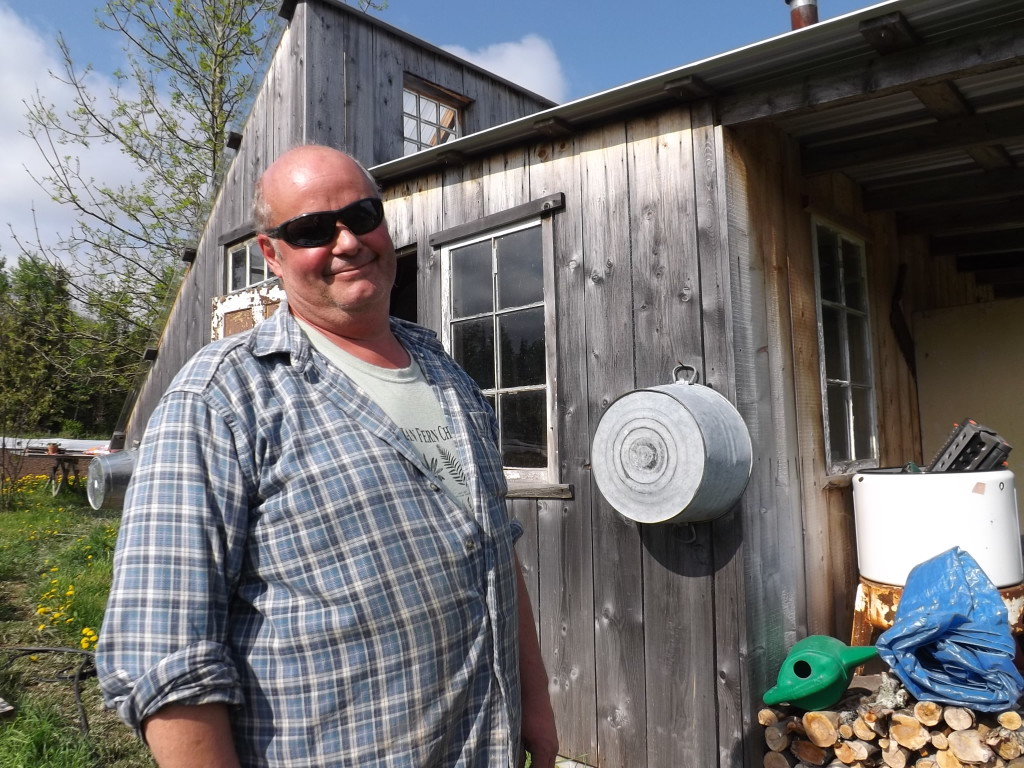
Ken McFadden. “Days can be up to 16 hours but without farmers people don’t eat. People seem to like what we do.”
I was left to roam around the field a while to take a few pictures. I started to feel pretty useless. As Ken McFadden put it, “There’s never a shortage of things to do around here.” Everyone was hard at work, filthy, sweaty -and oh yeah, cheerful too. I am struck by the superhuman energy of farmers and I guess their determination too.
I asked Ken if he ever felt like -particularly on those steamy July afternoons, he was going to drop dead in the field. “Yup,” he said without much thought. “But it’s got to get done. We have a chicken tractor that we use to move the chickens around to different spots on the property to graze. Around 2 in the afternoon I’ll throw a big ice block out for them and a lot of times they plunk right down on top of it. It gets that hot.”
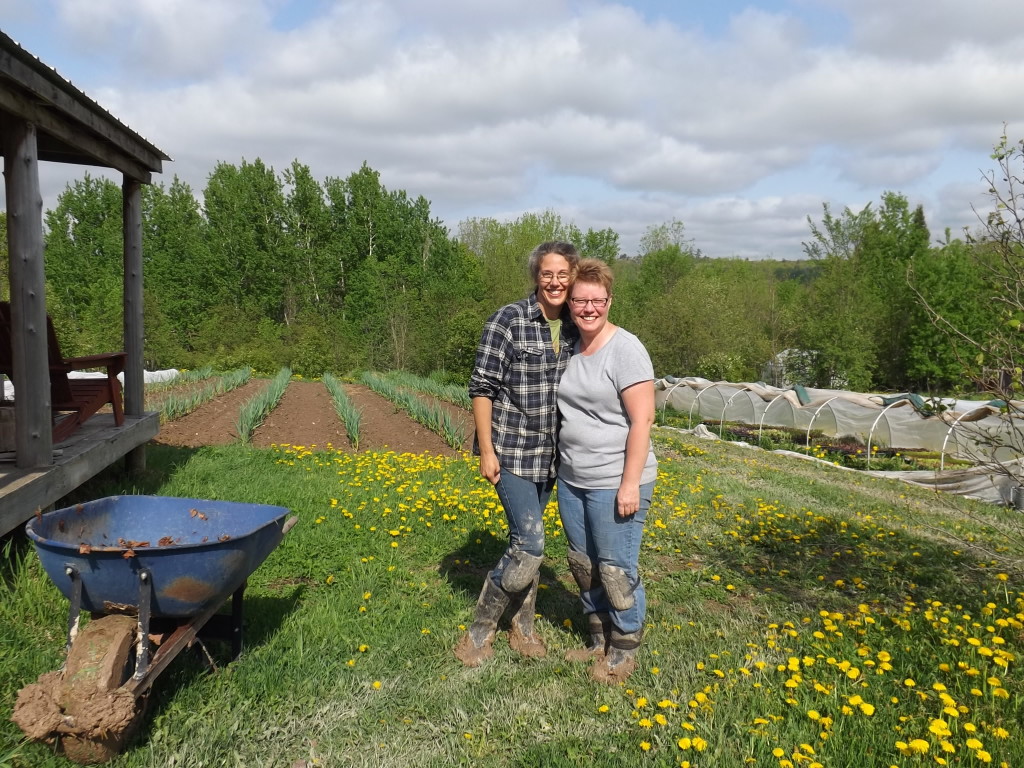
Michelle Monette, left, and Kim McHale, right. “Fannie’s is a wonderful place to be,” smiled Kim. “It’s lovely to be outside all the time and it’s good wholesome work. It’s hard work too but if feels good at the end of the day when you can look down that row and see it all finished.”
Michelle Monette, Fannie’s newest hired hand on the farm, admits that farming is not a job that everybody is cut out for. She should know. Michelle has been farming her entire life.
“It definitely takes a certain type of person. It’s a hard life. At the end of the day the endless hours and money made don’t match up,” admitted Michelle. “But if you love what you do that’s all that matters. And it’s a great way to raise a family. You work together and learn together. It’s a lot of family time. Farming is definitely not a job. It’s a lifestyle.”
Interested in becoming a part of Fannie’s V.I.P Club? Fresh produce delivered to your home once a week! Call Fannie at 705.782.2207 or email mcfaddensacres@hotmail.ca.
You can also find Fannie on facebook. Just look for: McFadden’s Acres Certified Organic Farm

